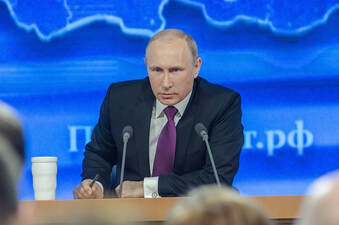 Vladimir Putin has been accused of multiple crimes and offences over the years, but until recently, antisemitism wasn’t one of them. In the last few months, he has come in for criticism from the West, from Israel and the Ukrainian leadership for a spate of antisemitic comments. Putin appeared on TV in early September ranting that “Western masters” installed Volodymyr Zelensky, “an ethnic Jew, with Jewish roots, with Jewish origins” as Ukraine’s president “to cover up the anti-human essence that is the foundation…of the modern Ukrainian state” and “the glorification of Nazism.” The diatribe followed comments made at the St Petersburg international economic forum in in June, when Putin was asked about the apparent contradiction of Ukraine being a Nazi state led by a Jew. “I have a lot of Jewish friends. They say Zelensky is not a Jew; he is a disgrace to the Jewish people,” he said. And most recently, speaking at an economic forum in Vladivostok, Putin said of the former senior Kremlin official Anatoly Chubais, who fled Russia after last year’s invasion of Ukraine and is reportedly living in Israel, “He is no longer Anatoly Borisovich Chubais, he is some sort of Moishe Israelievich, or some such.” The brand of ethnic nationalism that Putin has started to espouse sits rather strangely. Firstly, there’s that awkward issue in his repeated claims to be trying to “denazify” Ukraine, that the country’s leader is a Jew who lost several members of his family in the Holocaust. To those raised with a Soviet (or post-Soviet) view of history, this is less paradoxical than it seems. According to Soviet historiography, no specific emphasis was placed on the Nazis’ persecution of Jews, rather the focus was on the suffering of the Soviet people as a whole. And indeed, the suffering of the Soviet people was terrible, Hitler’s regime classed Slavs as sub-human and Communists were a mortal enemy. There was little awareness during Soviet times that the Jews had suffered any more than the rest of the population and many Russians have held onto that mindset. Putin’s antisemitic outpourings echo comments made in May last year by his foreign minister, Sergei Lavrov, comparing Zelensky with Hitler. Lavrov claimed that Jews had been partly responsible for their own murder by the Nazis because, “some of the worst antisemites are Jews,” and Hitler himself had Jewish blood. But the conflation of Zelensky and Nazism doesn’t fully explain Putin’s recent antisemitic outbursts. According to historian Artem Efimov, Editor-in-chief of Russian independent media outlet Meduza’s Signal newsletter, the Russian president is exploiting rhetoric to serve his purpose, whether that rhetoric is Marxist, right-wing or, indeed, antisemitic. His words are not based on any deep, systematic beliefs – for Putin has no ideology of his own – but serve as a means to justify his actions, Efimov says. Most notably, Putin repeatedly manipulates the collective memory of Russia’s struggle against Nazism in World War II – or the Great Patriotic War as it is known in Russia – to legitimise his imperialist ambitions in Ukraine. In pivoting towards antisemitism, Putin is repeating an age-old tendency to create a distraction, a scapegoat even, as his strongman image frays and begins to fall apart. As I have written before, Putin has more than a whiff of Joseph Stalin about him. Stalin, amid the paranoia and insecurity that characterised the final years of his rule, repeatedly resorted to antisemitism to push the blame onto others. The post-war years were characterised by Stalin’s purge of “rootless cosmopolitans”, a reference largely to Jews, whose loyalty to the USSR was questioned with the formation of the state of Israel in 1948. Well-known members of the Jewish Anti-fascist Committee, formed during the war to organise international support for the Soviet military effort, were arrested, tortured, and executed. Shortly before his death in 1953, Stalin launched another anti-Semitic purge in the form of the “Doctor’s Plot” – an alleged conspiracy by a group of mostly Jewish doctors to murder leading Communist Party officials. The plot was thought to be a precursor to another major purge of the party, and was halted only by Stalin’s death. Moscow’s former chief rabbi, Pinchas Goldschmidt, has repeatedly warned of rising antisemitism in Russia and urged Russian Jews to leave the country while they still can. Rabbi Goldschmidt resigned in July 2022 because of his opposition to the war and lives in exile in Israel. Tens of thousands of Russian Jews have already emigrated to Israel since the full-scale invasion of Ukraine began in February last year, the largest wave of departures since the fall of the Soviet Union.
0 Comments
Leave a Reply. |
Keeping stories aliveThis blog aims to discuss historical events relating to the Jewish communities of Ukraine, and of Eastern Europe more widely. As a storyteller, I hope to keep alive stories of the past and remember those who told or experienced them. Like so many others, I am deeply troubled by the war in Ukraine and for the foreseeable future, most articles published here will focus on the war, with an emphasis on parallels with other tumultuous periods in Ukraine's tragic history. Archives
March 2024
Categories
All
|
 RSS Feed
RSS Feed
